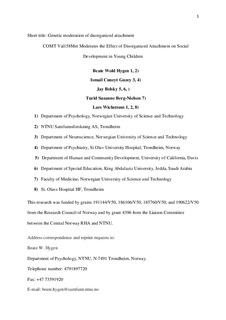Catechol-O-methyltransferase Val158Met genotype moderates the effect of disorganized attachment on social development in young children
Peer reviewed, Journal article
Submitted version
Permanent lenke
http://hdl.handle.net/11250/2483931Utgivelsesdato
2014Metadata
Vis full innførselSamlinger
Originalversjon
Development and Psychopathology. 2014, 26 (4pt1), 947-961. 10.1017/S0954579414000492Sammendrag
Children with histories of disorganized attachment exhibit diverse problems, possibly because disorganization takes at least two distinctive forms as children age: controlling–punitive and controlling–caregiving. This variation in the developmental legacy of disorganization has been attributed primarily to variations in children's rearing experiences. Here an alternative explanation of these divergent sequelae of disorganization is evaluated: one focused on genotype. Structural equation modeling was applied to data on 704 Norwegian children to test whether the catechol-O-methyltransferase Val158Met genotype moderates the effect of disorganized attachment, which was measured dimensionally at 4 years of age using the Manchester Child Attachment Story Task, on changes in aggressive behavior and social competence from ages 4 to 6. Children who scored high on disorganization and were homozygous for the valine allele displayed significantly greater increases in aggression and decreases in self-oriented social skills (e.g., self-regulation and assertiveness) over time than did their disorganized counterparts carrying the methionine allele, whereas disorganized children carrying the methionine allele increased their other-oriented social skill (e.g., cooperation and responsibility) scores more than did valine-homozygous children. These results are consistent with the controlling–punitive and controlling–caregiving behaviors observed in disorganized children, suggesting that the children's genotype contributed to variations in the social development of disorganized children.
